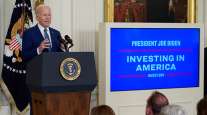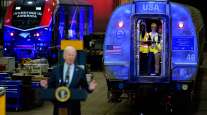Senior Reporter
Pete Buttigieg Touts Infrastructure Funding During Budget Hearing
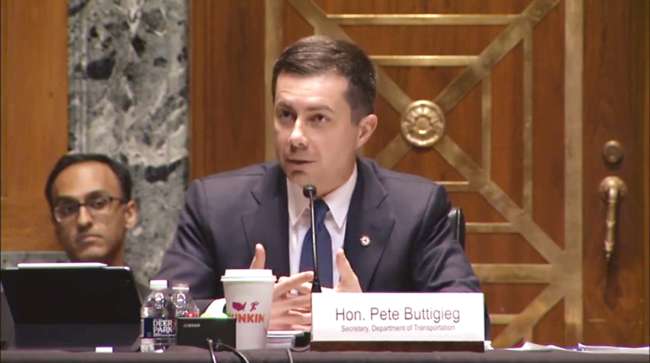
[Stay on top of transportation news: Get TTNews in your inbox.]
The country’s top transportation officer called on Senate funding leaders to approve the White House’s fiscal 2023 budget, one he said aims to modernize passenger and freight corridors with the goal of enhancing the economy.
During an April 28 hearing before the Transportation, Housing and Urban Development, and Related Agencies Subcommittee of the Senate Appropriations Committee, Transportation Secretary Pete Buttigieg said his department’s budget for the upcoming fiscal year focuses on improving freight access along supply chains. The request also dedicates funds and resources to support infrastructure upgrades designed to withstand severe weather events.
For the U.S. Department of Transportation, the White House is calling on congressional funding leaders to approve $142 billion for fiscal 2023.
Want more news? Listen to today's daily briefing above or go here for more info
“The department is now in a much stronger position to help build the transportation future the American people need and deserve: One that is safer, more efficient, and more affordable for everyone, from families transporting kids to businesses moving goods,” the secretary said.
He emphasized the Biden administration’s ongoing efforts to address supply chain disruptions also “support truck drivers, supplement inland ports, and modernize our port infrastructure, all to help move record volumes of goods more quickly and stem the rising costs of shipping.”
The request calls on Congress to approve $23.6 billion for aviation modernization, $4.45 billion for major transit projects, $3 billion for safety programs at the Federal Highway Administration, $1.5 billion for infrastructure construction grants and $230 million for port projects.
As the secretary put it, “At the department we understand that the tremendous opportunity we’ve been given to help modernize our country’s infrastructure comes with a profound responsibility to use taxpayer dollars efficiently and wisely, and to make resources more accessible to state and local governments so they can build good projects.”
Buttigieg suggested the budget request would complement funding approved in the recently enacted $1 trillion Infrastructure Investment and Jobs Act, commonly referred to as the bipartisan infrastructure law. That law dedicated more than $500 billion for highway-centric projects with a focus on severe weather resilience.
For the Federal Motor Carrier Safety Administration’s safety operations and programs the request calls for $367.5 million. For the agency’s safety grants division it proposes $506.1 million.
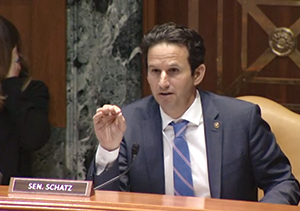
Schatz points to the need for sustainability and resilience. (Senate Committee on Appropriations via Youtube)
“FMCSA’s fiscal year 2023 budget, in concert with the bipartisan infrastructure law, will set the stage for forward-facing investments to address current realities and future visions for interstate commerce, [commercial motor vehicles] operations, and driver safety,” according to background the department provided. “The [fiscal-year] 2023 budget request prioritizes safety as the foundation of everything we do, while also helping the economy recover and rebuild from the COVID-19 pandemic, responding to the threat of climate change, implementing [bipartisan infrastructure law], and ensuring transportation is an engine for equity.”
Senate Democratic funding leaders, expected to debate a transportation spending bill in the coming months, mostly praised the president’s request for the U.S. Department of Transportation. Sen. Brian Schatz (D-Hawaii), the subcommittee’s chairman, touted the emphasis on sustainability and resilience.
“I’m glad to see a sustained focus on addressing climate change,” he said. “It continues to build on the nation’s electric vehicle infrastructure and it advances research into alternative aviation fuels and stronger fuel economy standards which would reduce carbon emissions by 2.5 billion metric tons.”
While efforts to promote infrastructure modernization won bipartisan approval, most senior Republicans took aim at a Federal Highway Administration memorandum issued on Dec. 16 titled, “Policy on Using Bipartisan Infrastructure Law Resources to Build a Better America.”
Regarding the FHWA memo, Sen. Susan Collins (R-Maine) said: “It appears to seek to discourage states from funding projects that add highway capacity.” Collins, the subcommittee’s ranking member, echoed fellow Republicans by stating her preference to provide states flexibility to determine the allocation of certain federal highway funds.
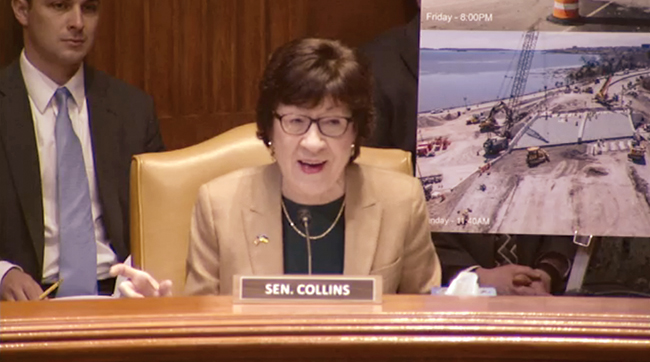
Collins emphasizes the need for states' flexibility. (Senate Committee on Appropriations via Youtube)
Current appropriations for DOT and most of the federal government expires at the end of September. Congressional leaders have yet to announce a timeline for considering fiscal 2023 funding legislation.


